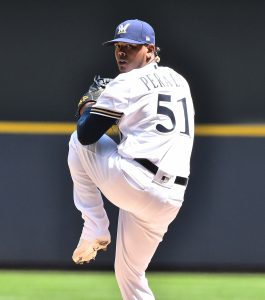Happy birthday to Diamondbacks right-hander Stefan Crichton, who turns seven years…er, make that 28 years old on this Leap Day. As you might expect, there haven’t been too many big leaguers born on February 29, though the date has produced a pair of very notable figures from baseball history. Pepper Martin (born in 1904) was a four-time All-Star who won two World Series titles as a member of the Cardinals’ legendary Gashouse Gang teams of the 1930’s. While the World Series MVP Award wasn’t instituted until 1955, it’s safe to consider Martin a retroactive winner for his performance in the 1931 Fall Classic, as he posted a 1.330 OPS over 26 plate appearances to lead St. Louis to victory.
Al Rosen (born in 1924) was also a four-time All-Star, as well as the American League’s MVP in 1953. Rosen hit .285/.384/.495 over ten outstanding seasons with the Indians in a career cut short by injuries, though he got to the Show in time to earn a ring with the 1948 Tribe, the last Cleveland team to win a World Series. After his playing career was over, Rosen served as the president/CEO of the Yankees (winning another Series in 1978), then president/general manager of the Astros (1980-85) and Giants (1985-92).
More from around baseball as we hit the last February 29 until 2024…
- Freddy Peralta’s representatives “weren’t too happy” with the right-hander’s decision to sign a five-year extension with the Brewers, Peralta told Tom Haudricourt of the Milwaukee Journal Sentinel and other reporters. Peralta is guaranteed $15.5MM over the next five seasons, plus as much as $14.5MM more if club options for 2025 and 2026 are both exercised. The contract gives the Brewers a lot of control over a pitcher who only has slightly more than one year of service time to his name, and Peralta said his agents at Rep 1 Baseball “didn’t really want to take it. At the end of the day, I know they wanted to wait a little longer.” Still, Peralta was focused on locking in a life-changing amount of money, calling the contract “something I’ve been working for my whole life….It was a chance to help my family, to help myself, and be in a position where I can play relaxed. My family can be a little more happy and relaxed. It definitely changes my mind going into every season, knowing that I have a little bit of security.”
- While Peralta could be leaving a lot of potential money on the table if he blossoms into a reliable pitcher, taking the extension could ultimately prove to be a wise choice considering that Peralta isn’t yet proven at the big league level. These types of early-career extensions involve “a risk tolerance for both sides,” Brewers GM David Stearns told Haudricourt and company, and “in this case, there was a clear desire from the player and a clear desire from the club” to get a deal done. Rather than specify a a specific starting or relieving job for Peralta, Stearns indicated “we think he could potentially have success in both roles, and as the game continues to evolve, as the use of pitching continues to evolve, there are probably going to be a whole bunch of pitchers who are asked to do both. And it wouldn’t shock me if Freddy is one of those guys.“
- The Mariners won’t use a set closer this season “unless somebody jumps up and grabs the position,” manager Scott Servais told reporters (including Ryan Divish of the Seattle Times). Barring a breakout performance from one of the many save candidates, the M’s will instead rotate between the likes of Yoshihisa Hirano, Carl Edwards Jr., Matt Magill, Dan Altavilla, Sam Tuivailala, and perhaps others in ninth-inning situations.
- Special assistant Dave Wallace and the Braves have “mutually agreed to part ways” after three seasons, USA Today’s Bob Nightengale tweets. This was Wallace’s second stint in Atlanta’s organization, after working as a minor league pitching coordinator from 2010-13. The 72-year-old Wallace is known for his many years as a pitching coach with five different teams, most recently working with Orioles pitchers from 2014-16.
